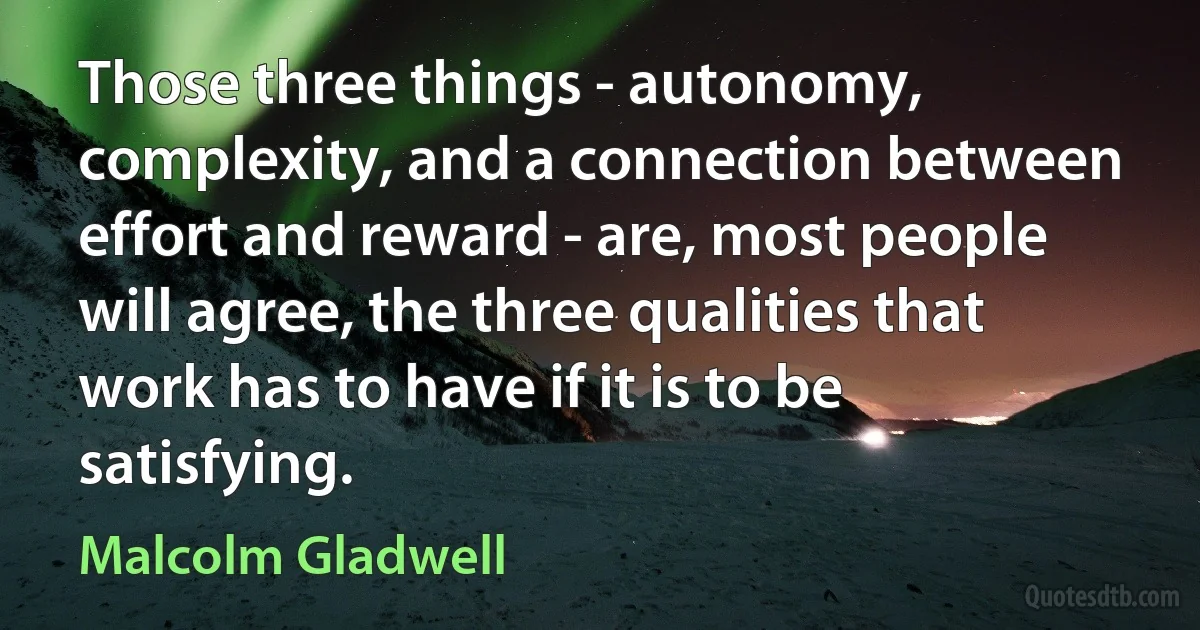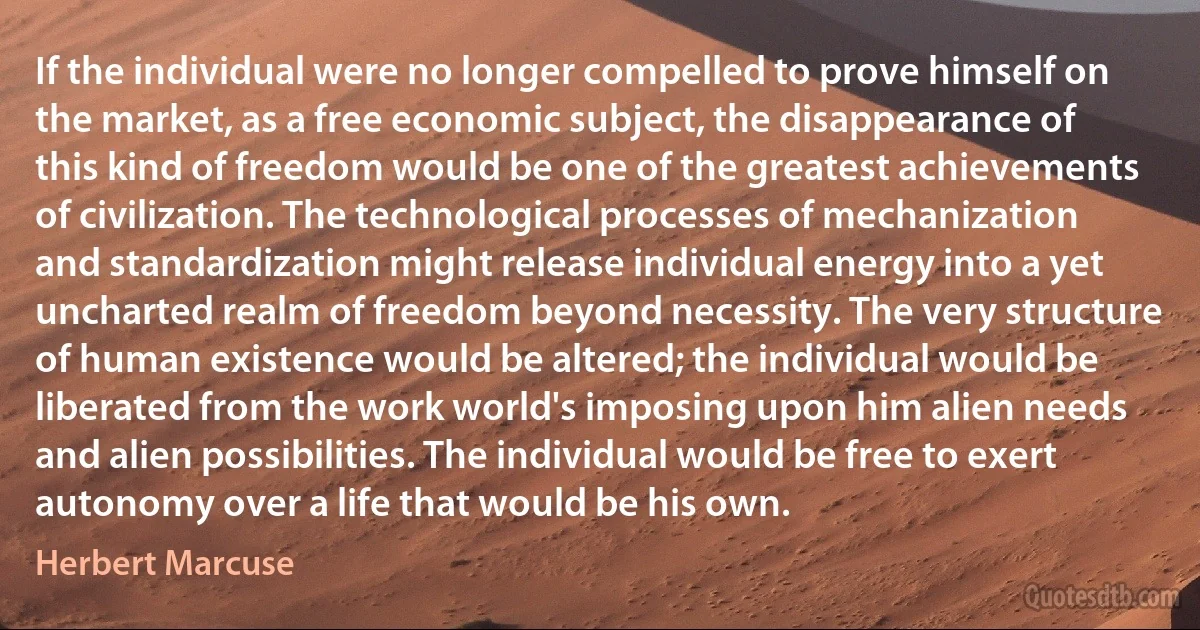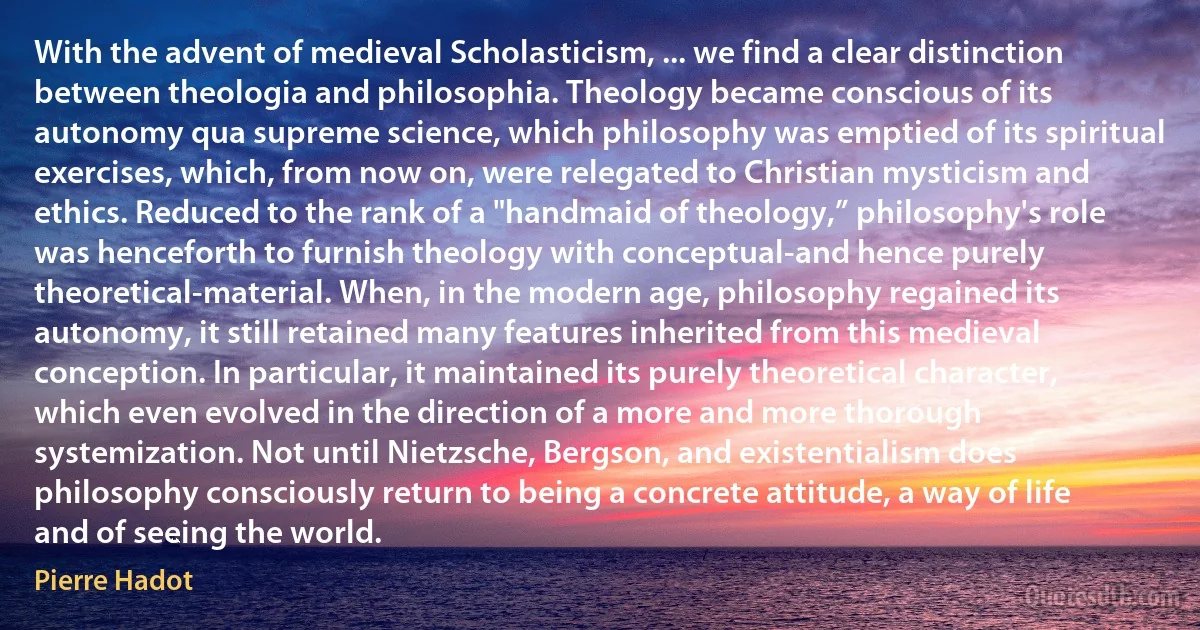Autonomy Quotes - page 3
Sight, when used in the context of nature, creates direct communication with reality. It implies that one is involved in this particular reality and quickly leads a person to action. But when the image has become artificial and is purely a means of knowledge, the reaction persists. I feel directly involved in what I see, just as prehistoric people did. And if I am seeing objects or ideas, I am not truly independent; I cannot really take my distance from these objects. From the intellectual point of view, this means I cannot really exercise my critical faculties. The use of images to transmit knowledge leads to the progressive elimination of distance between a person and his knowledge, because of the way we are made to participate when this means is used (this is, of course, in perfect accord with technical civilization, and to be desired by its standards). The critical faculties and autonomy of the thinking person are also eliminated.

Jacques Ellul
Our civilization has essentially globalized only the surfaces of our lives. But our inner self continues to have a life of its own. And the fewer answers the era of rational knowledge provides to the basic questions of human Being, the more deeply it would seem that people, behind its back as it were, cling to the ancient certainties of their tribe. Because of this, individual cultures, increasingly lumped together by contemporary civilization, are realizing with new urgency their own inner autonomy and the inner differences of others.

Václav Havel
The grimaces on these mocking distorted faces signalize disobedience, opposition and turmoil, as well as a kind of childlike autonomy in the depraved world of adults. The grin found on the faces of ill-treated children, a grotesque picture puzzle which includes both the martyrdom and subversion of mankind is entirely Helnwein's invention. It is manifested in the metamorphic images of injured bodies. It is an obsessive pattern which is repeated in Helnwein's pictoral representation of the world and in his staged artistic actions, serving as a metaphor for the invulnerability and invincibility deeply seated in man.

Gottfried Helnwein
In introducing the personal computer to the classroom, we shall be breaking a four-hundred year-old truce between the gregariousness and openness fostered by orality and the introspection and isolation fostered by the printed word. Orality stresses group learning, cooperation, and a sense of social responsibility... Print stresses individualized learning, competition, and personal autonomy. Over four centuries, teachers, while emphasizing print, have allowed orality its place in the classroom, and have therefore achieved a kind of pedagogical peace between these two forms of learning, so that what is valuable in each can be maximized. Now comes the computer, carrying anew the banner of private learning and individual problem-solving. Will the widespread use of computers in the classroom defeat once and for all the claims of communal speech? Will the computer raise egocentrism to the status of a virtue?

Neil Postman
A number of students denounce state intervention and the loss of university autonomy. This student sector reflects its class background while forgetting its revolutionary obligation. This sector has not realized that it has an obligation to workers and peasants. Our workers and peasants died beside the students in order to attain power.

Che Guevara
Azerbaijan has exhausted the resources of trust in terms of autonomous status for minorities within its boundaries. It was not and is not capable of providing guarantees of even internal security to such autonomies. There was once another Armenian autonomy in Azerbaijan: Nakhijevan. What happened to it? Not a single Armenian is left in Nakhijevan.

Serzh Sargsyan
Why is self-control, autonomy, such a threat to authority? Because the person who controls himself, who is his own master, has no need for an authority to be his master. This, then, renders authority unemployed. What is he to do if he cannot control others? To be sure, he could mind his own business. But this is a fatuous answer, for those who are satisfied to mind their own business do not aspire to become authorities.

Thomas Szasz
Henlein declared that Hitler told him, that he was to carry out an action against the Czceho-Slovak Republic particulary in such way as was originally planned by him. From the German point of view, this time was not convient due to the following reasons: Siegfired line on the French borders will be finished in approximately eight weeks, numerous German army is needed in Austria, whose withdrawal is also expected within the course of eight weeks, and finally Hitler will not allow to dictate himself when to start the action. He would start it only when he is a hunderd percent convicted that it will finish a full success.. Henlein declared further that, according to Hitler Slovakia will be returned to Hungary where Slovaks will obtain autonomy and that part of Czechia inhabitated by Czechs and Moravians will be joined to Germany with and extensive autonomy.

János Esterházy
The Enlightenment worldview held by Du Bois is ultimately inadequate, and, in many ways, antiquated, for our time. The tragic plight and absurd predicament of Africans here and abroad requires a more profound interpretation of the human condition - one that goes beyond the false dichotomies of expert knowledge vs. mass ignorance, individual autonomy vs. dogmatic authority, and self-mastery vs. intolerant tradition.

Cornel West
Another thing that they have tried to get us to believe in the last 150 years... is that the nation as the repository of sovereignty can be both a state and a community. ...Why did the English, the French, the Castilians, the Hohenzollerns, and others become the repository of sovereignty as nations... They did so because... weapons made it possible to compel obedience over areas which were approximately the size of these national groups... nationalism is an episode in history, and it fit a certain power structure and a certain configuration in human life in our civilization. Now... They all want autonomy. ...The nation or the state, as we now have it as the structure of power, cannot be a community.

Carroll Quigley
The deepest problems of modern life derive from the claim of the individual to preserve the autonomy and individuality of his existence in the face of overwhelming social forces, of historical heritage, of external culture, and of the technique of life. The fight with nature which primitive man has to wage for his bodily existence attains in this modern form its latest transformation.

Georg Simmel
In addition, profits are so completely subordinated in Germany and Italy to requirements of a militarily conceived national interest and of full employment that the maintenance of the profit principle is purely theoretical. Profits have lost their autonomy as an independent, not to say the supreme, goal of economic activity.

Peter Drucker
The man who is thus outside the confines of every value-combination, and has become the exclusive representative of an individual value, is metaphysically an outcast, for his autonomy presupposes the resolution and disintegration of all system into its individual elements; such a man is liberated from values and from style, and can be influenced only by the irrational.

Hermann Broch
The billable hours is a classic case of restricted autonomy. I mean, you're working on - I mean, sometimes on these six-minute increments. So you're not focused on doing a good job. You're focused on hitting your numbers. It's one reason why lawyers typically are so unhappy. And I want a world of happy lawyers.

Daniel H. Pink



